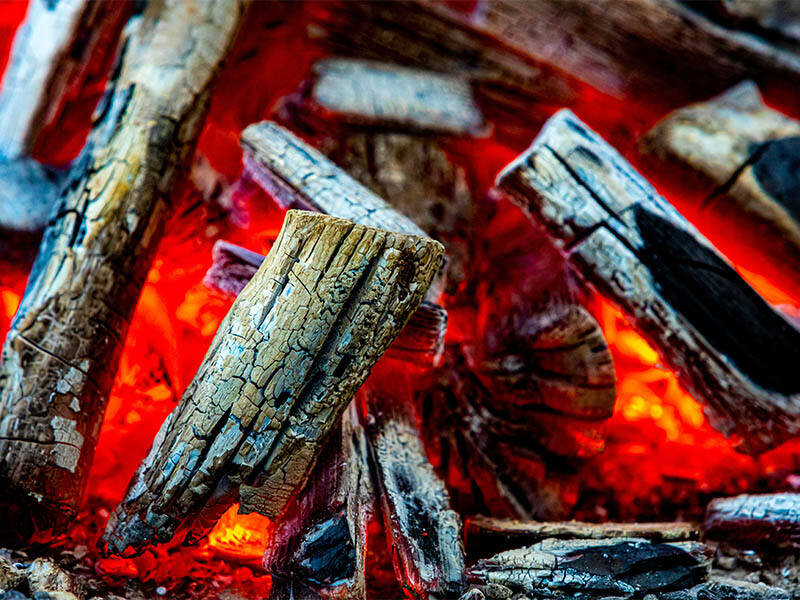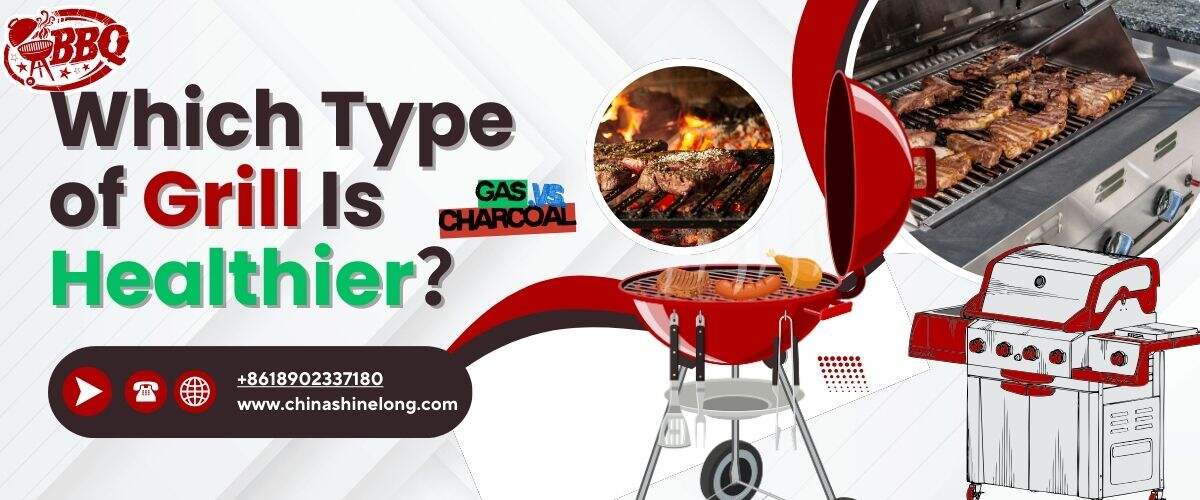News
Which Type of Grill Is Healthier? Gas vs Charcoal Explained
As the popular cooking method, Grilling has taken the global culinary trend by storm over the past several decades, shaping not only home cooking behind the backyard but also the operations of restaurants, hotels, and catering businesses. Since the demand for grilled foods continues to rise, with consumers increasingly concerned about both flavor and health, this concern has given rise to a critical question for chefs and operators alike: Is barbecue healthy?
This concern brings the debate to the table: Is charcoal grilling bad for you? Which type of grill is healthier? Whether you're running a BBQ joint or have a huge passion for grilled meat, you can't live without these two main types of grilling: gas and charcoal. They don't just determine the taste; they also impact health, safety, and kitchen efficiency. We're going to approach this from a commercial kitchen's perspective, helping you make the right decision on grilling methods and choose the most suitable commercial grills.
Does Grill Type Affect Health?
According to the U.S. National Cancer Institute (NCI, 2024), grilling exposes food to high heat and smoke, which can influence its nutritional quality. This process can lead to the formation of carcinogens like heterocyclic amines (HCAs) and polycyclic aromatic hydrocarbons (PAHs), which are easily formed during high-temperature cooking.
While grilling offers advantages such as lower fat content and intensified flavors, improper techniques or equipment choices may increase health risks.
For commercial kitchens, this is not merely a matter of personal preference. Restaurants must balance health-conscious dining with operational feasibility. As customers become increasingly aware of the risks and rewards of grilled food, businesses that show healthier grilling practices gain a competitive edge, making equipment choice a strategic decision.

Charcoal vs Gas Grill Health
Is Charcoal Grill Bad for You?
The debate often begins with charcoal grilling, which is synonymous with smoky flavor and traditional barbecue. However, from a health perspective, it presents a lot of challenges. Cooking meats over a commercial charcoal grill often means working with extreme heat; temperatures can reach above 300℃. At such levels, heterocyclic amines (HCAs) and polycyclic aromatic hydrocarbons (PAHs) are more likely to form. These compounds, produced when fat drips onto hot coals, have been linked to DNA mutations and elevated cancer risks.
Additionally, charcoal grilling generates substantial smoke. In commercial environments where volume is high, exposure to these particulates is magnified, raising concerns for both consumers and kitchen staff. While charcoal itself is not carcinogenic, its combustion byproducts are difficult to ignore.
Are Gas Grills Safer for Grilling?
Gas grills, in contrast, offer precision and control. With adjustable burners, chefs can maintain cooking temperatures between 190 to 240℃, sufficient to sear without excessive charring. This reduces the formation of HCAs and PAHs, making commercial gas grills a healthier option in many foodservice operations.
By the way, gas grills produce less smoke and fewer flare-ups, improving air quality in busy kitchens. From a workflow perspective, this efficiency supports faster service and consistent food quality, that's critical factors for restaurants, hotels, and institutional foodservice providers. While flavor may be less smoky than charcoal, the trade-off in safety and reliability is the main reason many commercial operators prefer gas systems.
The type of grill is not the only factor that determines the impact of grilling on health. What you cook matters just as much.
1. Red and Processed Meats: Beef, pork, lamb, hot dogs, and sausages carry inherent risks, especially when charred. Their higher fat content leads to flare-ups and greater PAH exposure.
2. Poultry and Seafood: Lean proteins such as chicken, turkey, and fish produce fewer carcinogens and align better with health-focused menus.
3. Vegetables and Fruits: Plant-based grilling introduces no HCAs or PAHs. Instead, grilled vegetables and fruits bring fiber, antioxidants, and phytochemicals that support overall wellness.
Some pro tips can help to reduce risk: marinating meats before cooking, cutting food into smaller pieces for quicker grilling, and flipping frequently to minimize charring. These techniques show that healthier grilling is achievable on both commercial charcoal grills and commercial gas grills, provided food choices are strategic.
Commercial Charcoal Grill vs Commercial Gas Grill
For BBQ joints that prioritize authenticity and smoky depth, commercial charcoal barbecue grills are still indispensable. It can bring a distinct charcoal flavor to your guests with old-school cooking methods. They are generally more affordable upfront, making them attractive for small businesses or outdoor dining venues.
However, purchasing these charcoal grills requires considering the safety and cleaning requirements, like managing ash disposal, planning a kitchen hood fire suppression system, and constructing a commercial range hood, ensuring safety protocols in response to the higher occupational risks through smoke exposure and open flames. For chefs, the balance lies in leveraging the flavor advantage while mitigating health and safety drawbacks.
Commercial gas grills have become the top choice for many professional kitchens because they strike a deal between health, efficiency, and reliability. Unlike traditional charcoal grills, a commercial gas grill allows chefs to manage precise temperature control, which is essential in large-scale foodservice environments such as hotels, restaurants, and institutional kitchens.
This consistency ensures that grilled meats are cooked evenly, reducing the risk of overcooking while also preserving flavor and texture. Another important health advantage is the reduced carcinogens formed during grilling compared with charcoal systems. Less smoke not only lowers the formation of harmful compounds linked to grilling but also creates a safer working environment for kitchen staff and a more comfortable dining atmosphere for customers.
While it is true that commercial gas grills require a higher upfront investment and regular maintenance, the long-term benefits often outweigh the costs. Their efficiency, compliance with commercial kitchen safety standards, and ability to deliver healthier BBQ cooking make them a great cooking equipment solution for the catering industry. For kebab stores seeking dependable equipment that supports healthier grilling without sacrificing speed or quality, gas grills remain the smarter long-term option.

Healthy Grilling Tips & Choosing the Right Grill
Whether you’re at home enjoying a weekend barbecue or running a popping commercial kitchen, combining smarter cooking habits with the right cooking equipment, you can enjoy grilled meats and vegetables with fewer risks and more flavor. Here are some takeaways:
Adopt healthier grilling habits: Trim excess fat, marinate proteins before cooking, flip foods more often, and experiment with vegetables or fruits on the grill. These simple steps help reduce harmful compounds linked to high-heat cooking.
Take advantage of commercial gas grills: With precise temperature control and reduced smoke output, a commercial gas grill makes it easier to produce consistently healthier results. They are especially valuable for chain restaurants, hotels, and institutional kitchens that prioritize efficiency and food safety.
Appreciate the tradition of commercial charcoal grills: For establishments focused on flavor authenticity, a commercial charcoal barbecue grill provides that rich smoky character guests love. The trade-off is more attention to heat management, ventilation, safety, and cleanup.
At the end of the day, there’s no single “healthiest” grill. The best option depends on your goals: consistency and safety lean toward gas systems, while flavor and tradition lean toward charcoal. Pairing the right grill with better cooking practices ensures barbecue stays both enjoyable and sustainable.
 After-Sales:
After-Sales:
 EN
EN
 AR
AR
 HR
HR
 NL
NL
 FI
FI
 FR
FR
 DE
DE
 EL
EL
 HI
HI
 IT
IT
 PT
PT
 RO
RO
 RU
RU
 ES
ES
 TL
TL
 ID
ID
 SL
SL
 VI
VI
 ET
ET
 MT
MT
 TH
TH
 FA
FA
 AF
AF
 MS
MS
 IS
IS
 MK
MK
 HY
HY
 AZ
AZ
 KA
KA
 UR
UR
 BN
BN
 BS
BS
 KM
KM
 LO
LO
 LA
LA
 MN
MN
 NE
NE
 MY
MY
 UZ
UZ
 KU
KU










